Summary
1. The Creative is the strongest of all things in the world. The expression of its nature is invariably the easy, in order thus to master the dangerous. The Receptive is the most devoted of all things in the world. The expression of its nature is invariably simple, in order thus to master the obstructive.
The Creative is the strongest of all things in the world.
This is the trigram of three solid lines and it represents the greatest strength or firmness.
Because it is all solid lines nothing can be stronger.
This is also the greatest brightness, the bright half of spring when daylight is increasing and there is more daylight than darkness.
It is the brightest half of spring as well. This represents the half of spring leading up to the longest day, June 21.
Things are as bright as they can get and the day is as long as it can be.
There is no longer day in the year.
Likewise it is the phase of the moon leading up to the full moon.
Moonlight is increasing and light is greater than the darkness as it builds up to its greatest.
This is the three hours before noon right up to true noon.
It cannot get brighter.
After this the sun will set.
The expression of its nature is invariably the easy, in order thus to master the dangerous.
If one is strong one can easily lift and move things.
One can easily win battles and conquer one’s opponent.
If one is the strongest, one will win.
The law of the strong, is the law of nature.
At the greatest brightness of the cycle one has more light and can see better.
When days are the longest, one can do the most.
Confidence will prevail and one will take on even dangerous tasks because the weakness of enemies can be seen and one will be able to express one’s confidence to the maximum.
This is the zodiac sign of Gemini, the strongest individual in the zodiac.
They will try anything once.
There is no stopping them.
When someone tells them no, they smile and do it anyways.
This is the strength and confidence of the increasing greatest light, the three solid lines.
Likewise in the moon cycle, one can do more and be more active at the full moon when even the night is lit up.
Likewise the three hours of the day leading up to noon is the easiest time of day to get things done because it is the brightest.
The Receptive is the most devoted of all things in the world.
The three broken lines imply the most yielding and weakest of things in the world.
It must be devoted to survive the force of stronger things.
The way of woman will be to align with the superior man.
It is in the best interest of the receptive to yield and not contend.
This is the understanding of Later Heaven.
This is the time of greatest darkness and cold.
Nothing is growing or active.
Left alone, the children will starve or die.
Here great attention is paid to vulnerabilities.
If there is action, it will have to be needed.
The most needed problems will get attention.
One looks carefully for firewood, shelter and food.
One cannot grow more food now and so must measure and make do with what is there.
If there is not enough to go around, the mother will do without.
This is a time of great sensitivity and receptivity to the problems of others.
It is not the time for independent action or thought.
Hence it is a time of devotion to the needs of others.
Likewise with the dark night of the new moon when little or nothing can be seen other than the stars.
In the day or rotation of the earth this is the time leading up to midnight, the greatest darkness.
This is the time when everyone is sleeping and vulnerable.
There is no movement here.
It is quiet.
If there is a sound or disturbance it will be a cause for concerned thinking.
One needs peace, quiet and darkness to sleep well.
It takes devotion to insure that all the actions and things that are needed for a good night’s sleep are taken care of in advance.
This is a time to let go and be receptive and yielding.
The expression of its nature is invariably simple, in order thus to master the obstructive.
The mother will be receptive to the basic needs of everyone.
She can take care of the little things.
It is simple, if one takes care of the little things, they will not build into bigger issues.
She will feed the children before they go to bed as it is difficult to sleep on an empty stomach.
At the time leading up to the greatest darkness of the year, or of the day,
There will be very little light and no time for big adventures or outings.
One must be content to take care of the simple little things, like the daily needs of food, fuel and shelter.
It is simple, if one wants peace and security one must be concerned about simple basic needs.
In this way everyone is included and no one is left out or ignored.
This is the team spirit of Sagittarius and the lullaby that puts children to sleep.
Any obstruction will disturb the peace.
2. To be able to preserve joyousness of heart and yet to be concerned in thought: in this way we can determine good fortune and misfortune on earth, and bring to perfection everything on earth.
To be able to preserve joyousness of heart and yet to be concerned in thought:
In the sequence of Later Heaven:
The superior man acts joyously and yet he is still concerned in thought.
He does not get carried away in happiness and pleasure.
While he is active, he remains concerned in thought and sincere.
In this way he keeps his actions virtuous.

To be active is the way of the creative father, or superior man.

To be concerned in thought is the way of the receptive mother or of virtue.
The superior man is strong but virtuous.
In the natural sequence of Earlier Heaven:
Joyousness of heart comes from the increasing light half of the cycle; in the year, the month and the day.
Light increases, activity becomes easier and the heavens are increasingly joyous.
This is the phase of winter and spring, Dec. 22 to June 21.
As the light increases everyone becomes happier.
As this is also mating season, joyousness of heart increases, and it increases right up to the longest day, June 21.
Being concerned in thought represents the way of increasing darkness; in the year, the month and the day.
As darkness increases one must become more and more concerned and receptive.
One must adjust what one does to accommodate the demands of the time.
It is getting colder and darker.
This is the summer and the fall, June 21 to Dec. 22.
One must nurture the crops, remove the weeds, reap the harvest, preserve the food and gather wood for warmth.
These are the simple chores of increasing darkness.
This is the way of the receptive earth, simple, sincere and concerned.
in this way we can determine good fortune and misfortune on earth,
In the sequence of Later Heaven:
Good fortune comes from holding on to the standard of what is appropriate.
Misfortune comes from not holding on to the standard.
One is active when it is appropriate and passive when it is appropriate.
In all things, the superior man holds to the standard.
He is firm and strong and acts easily, yet he also remains concerned and sincere and keeps life simple and virtuous.
Were he to deviate from the standard his actions would be considered inappropriate and loss would result.
Thus good fortune came from acting appropriately and from maintaining a sincere and dedicated character.
Misfortune could be seen whenever the standard was lessened or lost.
In the natural sequence of Earlier Heaven:
Good fortune comes as light increases and the weather gets better.
Good fortune comes as action becomes easier and as seeds are planted.
Good fortune comes with the finding of a mate.
In all these matters increasing light brings good fortune.
Misfortune comes as darkness increases and the weather gets colder.
Misfortune comes as action becomes more difficult and the harvest has to be reaped.
Misfortune comes with the extra needs of a mate and children.
In all these matters increasing darkness brings more difficulty and greater concern.
One must take care of the simple chores so that misfortunes do not increase.
and bring to perfection everything on earth.
This would be heaven on earth.
The superior man perfecting all of his actions for the needs of the emperor and for others.
If the standard is maintained and creative action guided by the changes then perfection becomes possible.
In the natural sequence of Earlier Heaven:
By increasing activity as daylight increases and doing what one can while the going is easy one is in tune with the time and gets ahead of his responsibilities.
This improves one’s fortunes.
What else could be more perfect on earth?
By acting according to the increasing concerns of increasing darkness one will take care of responsibilities.
If one takes care of one’s responsibilities problems will not accumulate.
Life will be simpler and secure.
One will not fall behind in one’s chores.
This will improve one’s fortunes.
If one remains receptive to the demands of the time and one acts appropriately everything on earth will be born, grow and come to completion appropriately.
This would be considered as perfection on earth.
3. Therefore: The changes and transformations refer to action. Beneficent deeds have good auguries. Hence the images help us to know the things, and the oracle helps us to know the future.
Therefore: The changes and transformations refer to action.
In the sequence of Later Heaven:
As the lines change and transform in the places different qualities and gradations of action occur.
Some actions are appropriate and superior.
Solid in an odd place and broken in an even place are appropriate actions.
Some actions are inappropriate.
Solid in an even place and broken in an odd place are inappropriate actions.
In all cases in the changes it is how the nature and the quality of actions are assessed.
In the natural sequence of Earlier Heaven:
As the lines change and transform in the six places different qualities and gradations of action occur.
As daylight increases, actions become stronger, more abundant and easier.
As darkness increases, or daylight decreases, actions become more cautious, less abundant and more conditioned.
Under increasing darkness simple actions prevail.
Such is the pulse of life and the way of nature.
Beneficent deeds have good auguries.
In the sequence of Later Heaven:
Appropriate actions are beneficent and good fortune results hence they are given good auguries.
In the natural sequence of Earlier Heaven:
Actions aligned with the flow of increasing and decreasing light are considered wise and will increase one’s fortunes.
Hence they are given a positive interpretation.
Hence the images help us to know the things,
In the sequence of Later Heaven:
The images are the images of the trigrams from beginning to end, from one extreme to the other, from the creative to the receptive, and from the easy to the simple.
Each trigram has its image and association to things.
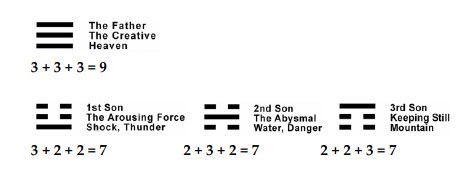
Odd numbered images are male.
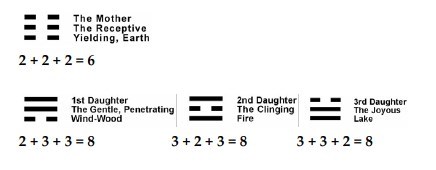
Even numbered images are female.
From these images and associated things the basic understanding of the changes develops.
In the natural sequence of Earlier Heaven:
There are images in the heavens
Their associations and their sequence determine the understanding of change and the things associated with change.








and the oracle helps us to know the future.
In the sequence of Later Heaven:
The oracle is the divination or counting of yarrow stalks to determine the hexagram for the moment.
The hexagram and its images would answer the question and show the future implications of the situation.
In the natural sequence of Earlier Heaven:
Knowing the great extremes meant to know the great beginnings and the great endings, and from these, the phases of increasing light and increasing darkness can be known.
The influence of the changes of light on the earth, changes of the seasons on each day, and of the zodiac on each house, could be observed and subsequently known in advance.
From this knowledge of the future guidance for beneficial action was determined;
Easy action when the light increases, simple action when the darkness increases.
From knowledge of the seasons, the zodiac, moon phases, and days (circumstances on the earth), the future could be known and the almanac written to give beneficial advice, and to emulate the nature of the gods.
Thus heaven prevails over the earth and light over darkness.
When one knows the cycle of changes life becomes easy and simple and good fortune results.
One is blessed by heaven, nothing that would not further!
4. Heaven and earth determine the places. The holy sages fulfill the possibilities of the places. Through the thoughts of men and the thoughts of spirits, the people are enabled to participate in these possibilities.
Heaven and earth determine the places.
In the sequence of Later Heaven:
Heaven is above and earth is below.
The six places are the gradations going from the first place, which is below and closest to earth.
The second and third places are also below in the bottom half of the hexagram and thereby close to the earth.
The fourth, fifth, and sixth places are closer to heaven.
The sixth place is the uppermost and closest to heaven.
In this manner heaven and earth determine the places.
In the natural sequence of Earlier Heaven:
The places all have their fixed positions and are light and dark accordingly.
The greatest darkness and the greatest light determine the extremes.
From these the places are allocated.
Daylight increases in the first place from Dec. 22 to June 21.
Darkness increases in the first place from June 21 to Dec. 22 .
The first place reveals whether daylight is increasing or darkness is increasing.
The second place reveals whether there is more daylight than darkness or more darkness than daylight.
When solid it reveals that daylight is greater, the spring and summer half of the year, Mar. 21 to Sept.23.
When broken it reveals that darkness is greater, the fall and winter half of the year, Sept. 23 to Mar, 21.
The first two places determine the season.
Solid and broken in the first and second place signifies winter.
Solid and solid in the first and second place signifies spring.
Broken and solid in the first and second place signifies summer.
Broken and Broken in the first and second place signifies fall.
The third place signifies the light and the dark half of each season.
The fourth place signifies the light and the dark half of each half-season.
The fifth place halves the portion again.
The sixth place halves the portion again.
Thus the sixty-four hexagrams are arranged in their proper sequence, as aligned to the seasons of the year and zodiac, the moon phases and to the rotation of the earth in a day.
Thus is the standard for natural observation is set.
The seasons and their changes can be clearly observed and predicted.
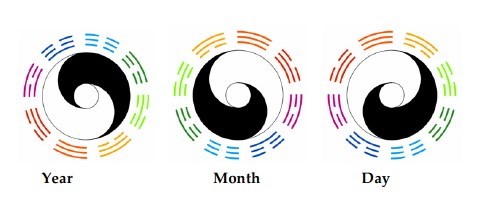
YEAR
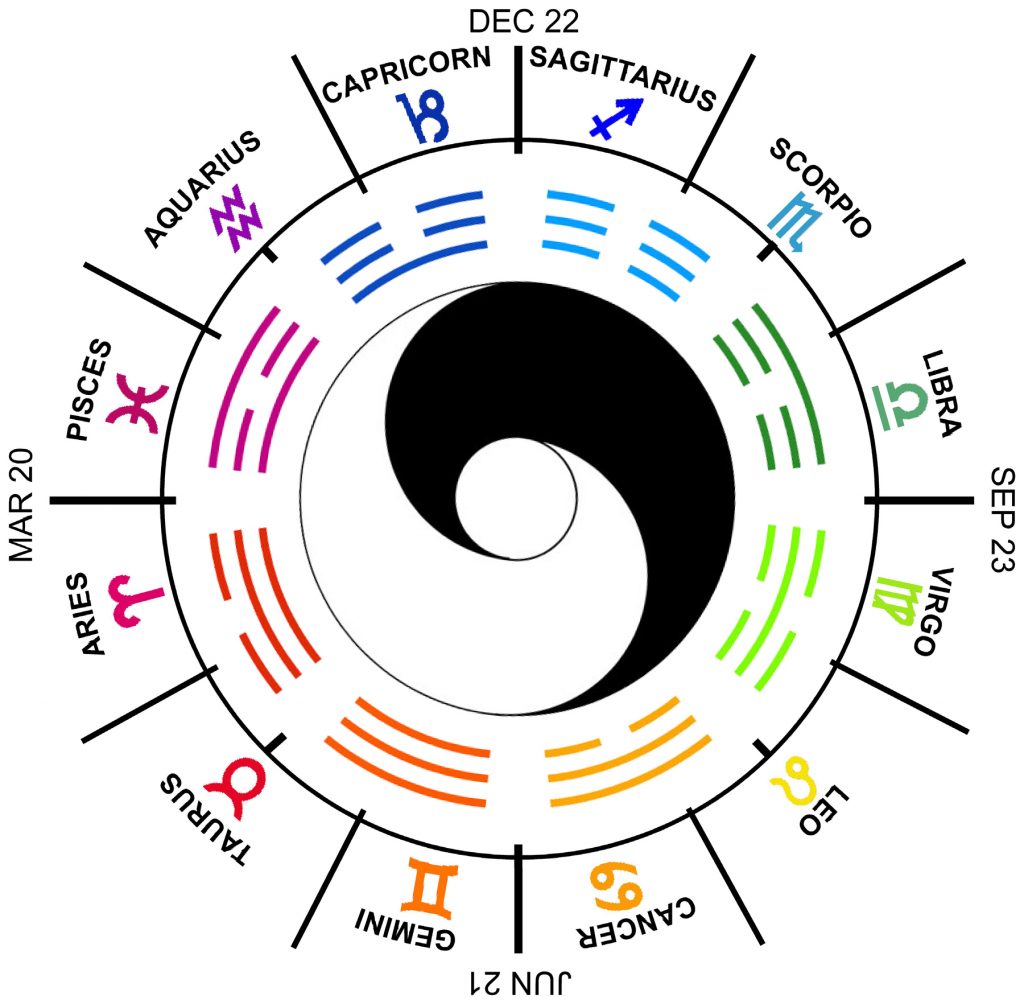
DAY
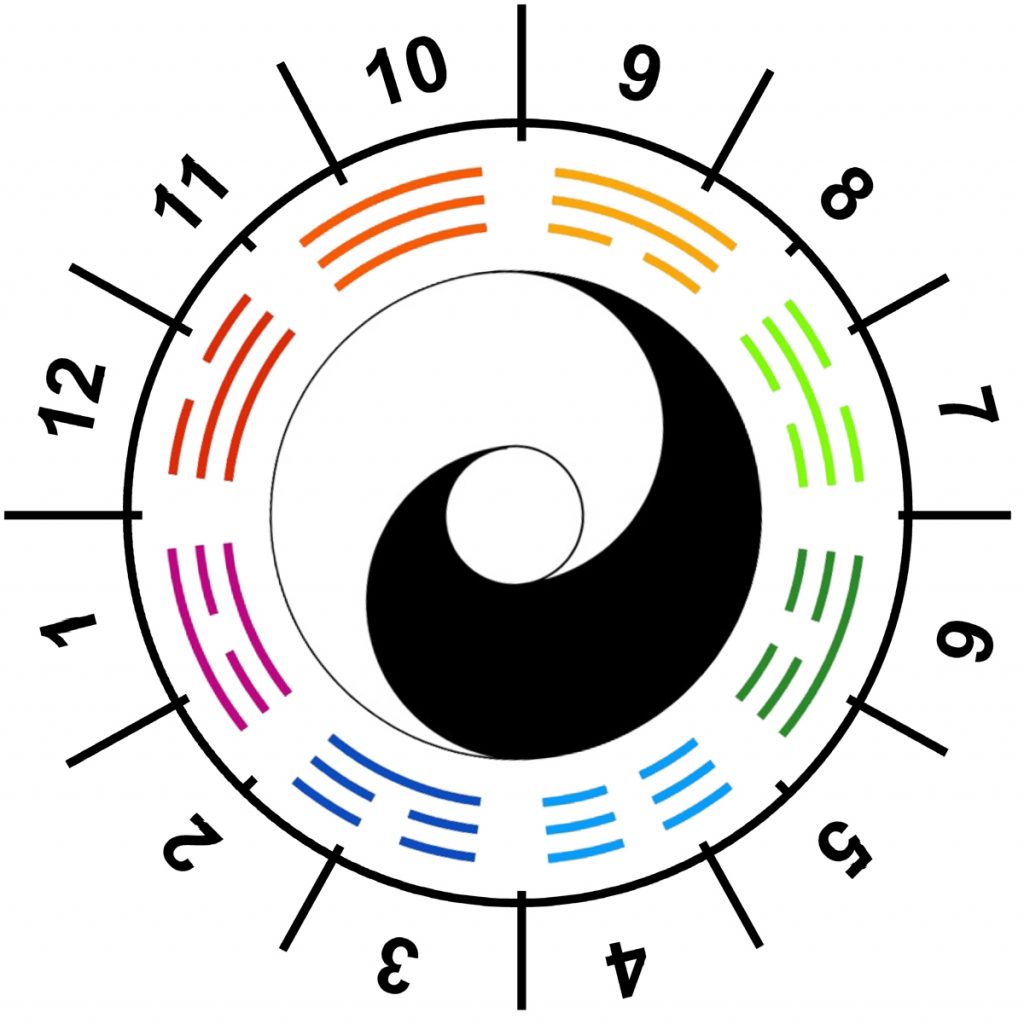
MONTH
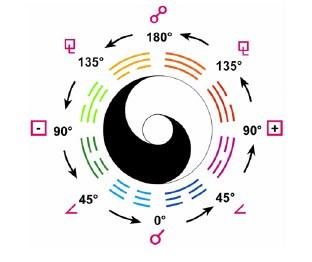
MOON
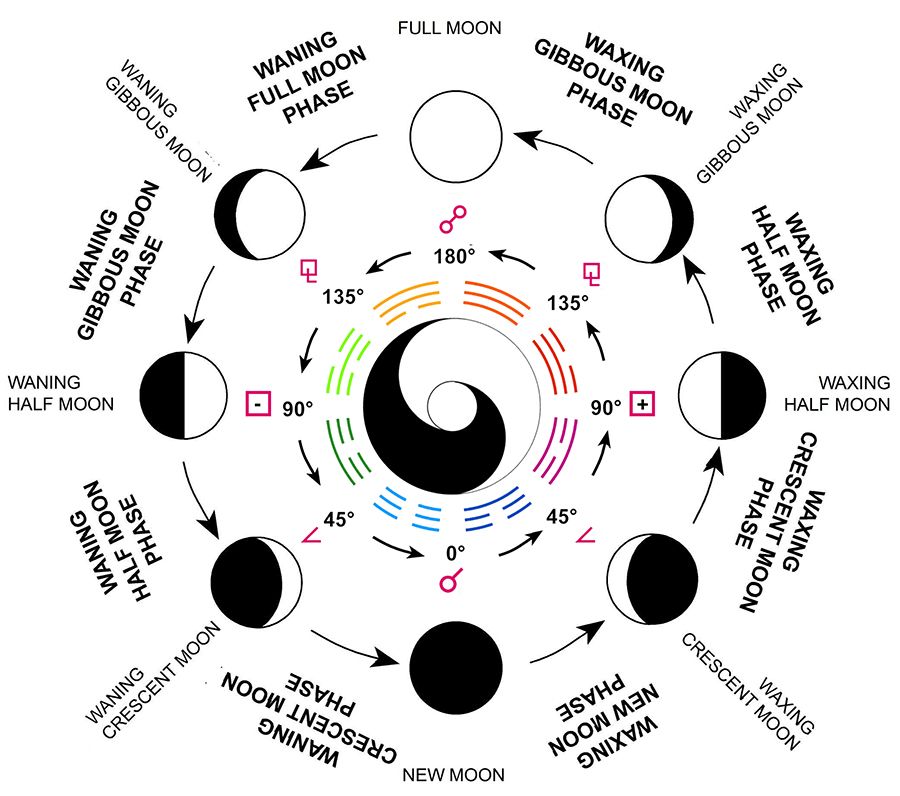
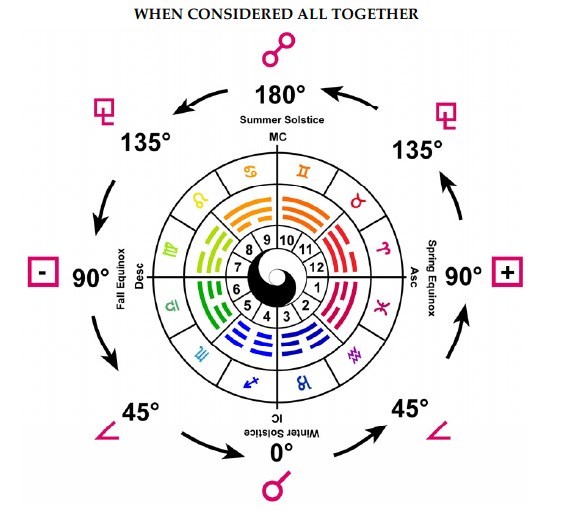
The holy sages fulfill the possibilities of the places.
In the sequence of Later Heaven:
The holy sages were the superior men who acted appropriately and elevated their natures.
This they accomplished by using the oracle.
In the natural sequence of Earlier Heaven:
The holy sages were the astrologers who knew the action of the gods, or moving lights, through the places or degrees of the heavens or zodiac.
They also knew the subsequent influence of the gods on the circumstances or affairs of the earth, the lines on the earth , the houses.
Through this knowledge they could fulfill the heavenly commands as expressed in the changes and fulfill them as best as possible in the affairs of the earth.
Through the thoughts of men and the thoughts of spirits, the people are enabled to participate in these possibilities.
In the sequence of Later Heaven:
This is the perspective of the Later Heaven priests or monks.
The thoughts of the wise men or diviners were able to understand the thoughts of the spirits and thereby could interpret the divination (the divined hexagram) to the ordinary person.
In the natural sequence of Earlier Heaven:
The thoughts of the spirits probably referred to the light of the gods in the heavens and their positions in the places of the hexagrams.
Through understanding the changes one could think about the ways of the gods and their influence on earth, creating the seasons, moon phases and hours of the day.
Through the use of the changes or astrology, anyone could tune into the ways of heaven and to what other wise people had to say about the influence of the gods, and could by themselves, elevate and improve their life by using the changes.
One could participate in the possibilities presented, and could elevate one’s nature and even assist the gods themselves.
5. The eight trigrams point the way by means of their images; the words accompanying the lines, and the decisions, speak according to the circumstances. In that the firm and the yielding are interspersed, good fortune and misfortune can be discerned.
The eight trigrams point the way by means of their images;
In the sequence of Later Heaven:
This is a statement from Confucian or Later Heaven understanding.
The images and attributes of each trigram were used to make the associations referred to in the Hexagrams.
From this association, further implications could be seen and advice given or gained.
In the natural sequence of Earlier Heaven:
The eight trigrams while having attributes and images primarily gained their meaning by the season of the year or the time of day.
The sequence and the increasing light and darkness set the main images and revealed the nature of the light coming from the heavens.
This eightfold division of the year is the foundation of the tropical zodiac of seasons.
The way implied the natural balance, and sequence of the trigrams, of the light in the heavens and the rotation of the earth or the day.
the words accompanying the lines, and the decisions, speak according to the circumstances.
In the sequence of Later Heaven:
The circumstances are the gradation of the lines in the places, and the interrelations of the lines in the upper and lower trigrams, and in the inner or nuclear trigrams.
This revealed a unique texture or set of influences for each place in the hexagram.
The words passed on in the texts elaborate these circumstances.
In the natural sequence of Earlier Heaven:
According to the circumstances, it would imply first the position in the seasonal sequence and then in the hourly circumstances across the day.
In astrology the zodiac represented the influence of the seasons across the year, and the houses represented the worldly or daily circumstances and affairs.
Thus the expression would imply an interpretation of the heavenly lights and their influence on the daily affairs, how the zodiac signs affected the houses.
It would also imply an emphasis on mundane or worldly interpretations over celestial interpretations.
This division is also rampant in the various applications of astrology, from the spiritual to the mundane.
In that the firm and the yielding are interspersed, good fortune and misfortune can be discerned.
In the sequence of Later Heaven:
The firm and the yielding are the ways of life on earth.
We stand secure, or we yield.
These lines are dispersed through the six places.
Good fortune and misfortune can be discerned from their appropriateness or lack thereof.
In the natural sequence of Earlier Heaven:
The firm and the yielding show the effects of the light and the dark on earth.
They reveal the changes on earth below where man lives and moves.
Good fortune and misfortune are images of gain and loss.
The focus here is on the way of the twenty-four hours of the day or the twelve astrological houses (2 hour periods) that reveal the worldly circumstances and potential of each phase or hour of the day and night.
The focus of advice is on how to improve one’s worldly fortunes.
Good fortune and misfortune develops from how well one lives according to the pulse of life or the needs of each season.
6. Changes and movements are judged according to the furtherance (that they bring). Good fortune and misfortune change according to the conditions. Therefore: Love and hate combat each other, and good fortune and misfortune result therefrom. The far and the near injure each other, and remorse and humiliation result therefrom. The true and the false influence each other, and advantage and injury result therefrom. In all the situations of the Book of Changes it is thus: When closely related things do not harmonize, misfortune is the result: this gives rise to injury, remorse, and humiliation.
Changes and movements are judged according to the furtherance (that they bring).
In the sequence of Later Heaven:
The changes and movements refer to the changing lines that were 6 or 9 in the counting of the yarrow stalks.
The judgements would show if this change was helpful to the person or whether it would hold him back or cause a setback.
Hence, “That which furthers” or “Nothing serves to further” are common comments.
In the natural sequence of Earlier Heaven:
The changes and movements of the moving lights or gods through the images and places would reveal what influences were being added to one’s life.
For example: a Mars aspect would speed things up or force action, while a Saturn aspect would slow things down and enforce patience and caution.
Hence, the judgements were astrological in nature.
Good fortune and misfortune change according to the conditions.
In the sequence of Later Heaven:
This refers to the position of the lines in the places and the conditions of the trigrams involved.
What is above? and what is below? and what is appropriate (odd or even)?
In the natural sequence of Earlier Heaven:
Again an astrological nature is apparent.
The movement of heavenly lights in the heavens reveal the changing conditions.
Each planet or god has its own qualities and influence.
Each hexagram has its own indication of increasing light and activity, or increasing darkness and inactivity.
Therefore: Love and hate combat each other, and good fortune and misfortune result therefrom.
In the sequence of Later Heaven:
This is a Later Heaven conclusion or judgement and it makes an unusual reference to hate which is not used in the changes.
It seems that someone with lesser understanding is drawing conclusions from what might appear to be opposites.
The structure and sequence of the Later Heaven arrangement came from random pairs of opposites being presented.
This is a similar but perhaps inappropriate association to love and hate.
It tends to give a much greater scope to hate, as a balance to love,
than is probably valid.
Perhaps this might keep the people in fear?
But it is not in harmony with the way of the changes or their sequence.
Perhaps it reflects a bias or limitation of King Wan and the Duke of Chou as they interpreted the changes and rearranged the order of the changes to diminish the ways of the past or the natural sequence?
Firm and yielding, light and darkness are more inclusive than love and hatred.
Perhaps caring and not caring would be better words?
Or perhaps that is what is meant here?
This would fit better to the creative and the receptive.
Love and hate, leaves one to wonder if hate is the creative father, or the receptive mother?
It certainly is an issue that most people would react or respond to.
It simply has a different sensitivity than the teachings of the changes.
In the natural sequence of Earlier Heaven:
It is the light and darkness that balance and alternate with each other across the seasons and through the hours of the day.
But it was not considered that they fought each other.
This implies violence, anger and perhaps hate.
Hate was not part of the way of Earlier Heaven.
It was about being in harmony with nature and its changes and living appropriately.
If one did not live appropriately one would suffer from the results of one’s actions.
The idea of hating and projecting negativity was not considered worthy of even mentioning.
And if it was referred to it was done in a detached manner and not in an emotionally charged or biased manner.
The most valuable asset of the superior man or warrior was a good night’s sleep, as it improved health, alertness and strength.
If one let his personal relationships deteriorate into negativity there would be no peace, much blame, and little sleep.
Hence attention was given naturally to personal relations and seemingly petty circumstances.
Over time, this emphasis was replaced by the need to be strong and devoted to the emperor.
This reveals an increasing political application of the changes
where people should do as they are told and not contend with authority.
Even King Wan and the Duke of Chou spent their lives contending with authority and diminishing the influence and clarity of his ancestors, or of Fu Hsi and the sequence of Earlier Heaven.
So the introduction of submission and humility in favour of the society and emperor is something that worked its way into the changes as a new bias over the centuries.
This bias, even in the works of Confucius, was solidly in favour of the government or ruler with almost no credibility for personal worth or value.
These distortions accompanied the changes to the sequence of trigrams.
If one could change the order of the ancestors, what else could not be changed?
Why would one want to change away from the natural order of things?
A great schism in the perception of the way took place around 1200 BC, and many secrets and distortions grew, like weeds in an unattended garden.
The far and the near injure each other, and remorse and humiliation result therefrom.
This is another naïve expression and it takes a rather aggressive view of the changes.
The far and the near usually leave each other alone.
It is generally the point of least influence.
What is suggested here is that the superior man might not hold to the same virtue when he is away from his wife or the emperor.
It is an attitude that encourages control by the emperor and obeisance from all others.
Perhaps this is the seed of a concern in modern China?
Attaching remorse and humiliation to behaviour at a distance or close by is perhaps a factor of the era of Later Heaven and its mathematical or abstract concepts.
It does seem valid in one way.
It seems that as man has moved away from nature he has damaged his closeness to living things and often considers himself beyond nature and the conqueror of nature, rather than the preserver and defender of it.
From such a distance it would be difficult to have a clear conscience or sleep well.
From such a distance the world would become overrun with weeds and pollution, which would significantly impair the nature of closeness.
It seems like the era of Later Heaven has moved far away from the era of Earlier Heaven.
It also seems like great remorse and humiliation are due!
In astrology or worldly assessments there is an opposition between personal security at home (IC) and one’s position or job in the world (MC).
The challenge is to integrate these two polarities constructively, rather than have them injure each other.
Any bias applied to the changes or to life should stand the test of nature and time.
It should be viewed with discrimination as the changes are meant to give a wholesome, inclusive and balanced understanding in life.
The changes are a special language.
Unfortunately, as with most languages, most people use it very grossly and do not attain to higher or more enlightened perception.
One cannot expect to find sophisticated uses of a language in a local newspaper.
But in the Great Treatise of the I Ching one should expect the highest and most elevated thinking and perception.
To think that one knows is folly.
That King Wan and the Duke of Chou would consider themselves knowledgeable enough to alter the changes and their natural sequence is a poignant example of such folly.
Thus the ignorance originating over three thousand years ago continues to obscure the inherent clarity within the changes to this present day.
It is the changes that are the teachers, more than the priests who interpret them.
The true and the false influence each other, and advantage and injury result therefrom.
Unfortunately this leads one to think that the superior man is true and right, but where does that leave the mother or women in general?
Again, this is another naïve concept prominent in abstract mathematical deduction but divorced from nature.
If one is looking for help and guidance in life, will one look to nature or somewhere else?
In all the situations of the Book of Changes it is thus: When closely related things do not harmonize, misfortune is the result: this gives rise to injury, remorse, and humiliation.
Again this is a naïve concept and an abstract idea.
If a child does something wrong and the parent confronts and challenges him or her, good usually results.
If a parent just holds to harmony the child may not learn the lesson at home and may have to learn from harsher realities, like employers or legal authorities.
Hence avoiding stress is not the way to harmony.
It is more simply, doing what is required and not letting problems accumulate or grow.
This theme is presented in the texts of Later Heaven, but clearer and more astute insights will arise from the more natural sequence of life as presented in the sequence of Earlier Heaven.
7. The words of a man who plans revolt are confused. The words of a man who entertains doubt in his inmost heart are ramified. The words of men of good fortune are few. Excited men use many words. Slanderers of good men are roundabout in their words. The words of a man who has lost his standpoint are twisted.
As light increases so does activity and thinking.
As thinking increases so do words.
Words are a disturbance of silence and a belittling or rationalizing of experience.
Words are a disturbance of the peace, and they should be arrested.
The more one knows, the less one talks.
The more one talks, the less one knows.
Words are the trails to images,
Images are the traps of meaning.
Follow the words to gather the images.
When one sees the images, what need is there of words?
Gather the images until the meaning is grasped.
When one has grasped the meaning, what need is there of images?
What is given in this closing verse are examples of how people get into trouble through words and how silence would be more effective.
So within the Great Treatise itself is a warning about the nature of words added to the hexagrams.
In the rearrangement of the trigrams in the Later Heaven sequence many words of abstract rationalization were added.
Were the natural teachings of silence lost?
